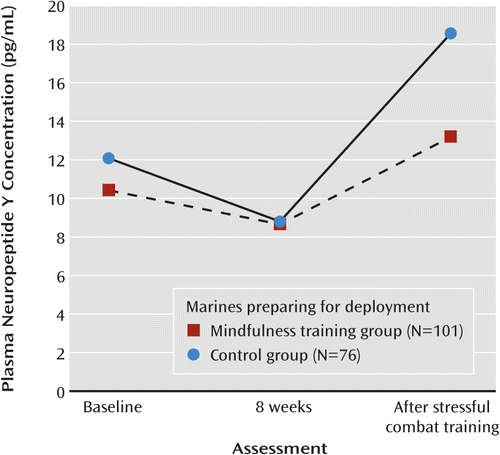In This Issue

Mindfulness training of Marines enhanced their physiological recovery after stress-inducing predeployment training episodes. Johnson et al. (CME, p. Original article: 844) demonstrated that after 8 weeks of Mindfulness-Based Mind Fitness Training, 147 Marines had faster recovery of heart and breathing rates, lower neuropeptide Y concentrations after stressful training, and less brain activation in regions related to interoception, the awareness of one’s own physiological state. The focus on recovery from stress, states Brewer in an editorial (p. Original article: 803), fills a gap left by the traditional emphasis on precombat exposure experiences to inoculate soldiers against the stressful experience itself.
Effects of Maternal vs. Paternal PTSD
Gene expression can be down-regulated by methylation of DNA sequences in the gene’s regulatory regions. Such methylation has been related to the effects of early trauma. Yehuda et al. (CME, p. Original article: 872) found a transgenerational effect. Adult children of fathers with Holocaust experience and posttraumatic stress disorder (PTSD) had greater methylation of a promoter region in the glucocorticoid receptor gene than did comparison offspring. However, offspring with both maternal and paternal history of Holocaust PTSD had lower than normal methylation. Lower methylation was associated with greater postdexamethasone cortisol suppression, a key pathophysiological feature of PTSD hyperresponsiveness. Paternal PTSD was linked to dissociative experiences in offspring. Editorialist Spiegel (p. Original article: 811) discusses the importance of recognizing the new DSM-5 dissociative subtype of PTSD.
Cortical Dopamine in Alcoholism
Abstinent alcohol-dependent patients have lower dopamine transmission in the prefrontal cortex and other cortical regions than do healthy subjects. The findings of Narendran et al. (p. Original article: 881) with positron emission tomography (PET) are consistent with previous anatomical associations for anhedonia, decreased reward sensitivity, and impaired executive functioning. The study’s innovative PET methods, predicts Smith in an editorial (p. Original article: 814), will pave the way for greater targeting of alcoholism treatments to dopaminergic systems.
Childhood Maltreatment and Brain Structure
Abnormalities of brain structure related to childhood abuse or neglect are apparent from a whole-brain meta-analysis. Lim et al. (p. Original article: 854) included 12 studies comparing a total of 331 children or adults exposed to childhood maltreatment with unexposed individuals. Those with early maltreatment had gray matter abnormalities in the orbitofrontal-temporo-limbic regions, which govern affect, and in the left inferior frontal gyrus, which controls cognitive functioning.

The case of a delirious woman with chronic obstructive pulmonary disease who needed a lung transplant required collaboration between psychiatric and pulmonary teams. Wilkinson et al. (p. Original article: 821) report that her manic symptoms and agitation caused her removal from transplant eligibility. Likely causes for the delirium included metabolic insults, severe hypercarbia because of her inability to comply with respiratory therapy, prolonged steroid exposure, benzodiazepine intoxication, and recent ECT, administered in attempts to reverse her delirium. After transfer to the teams at Johns Hopkins, her prednisone was tapered to 1 mg/day. She was treated with low-dose risperidone, which was eventually supplemented by moderate doses of quetiapine and lithium (serum level, 0.3 mmol/L). After a several months’ relapsing and remitting course for both the delirium and lung disease, her mood and pulmonary status eventually stabilized and she underwent successful lung transplantation.



